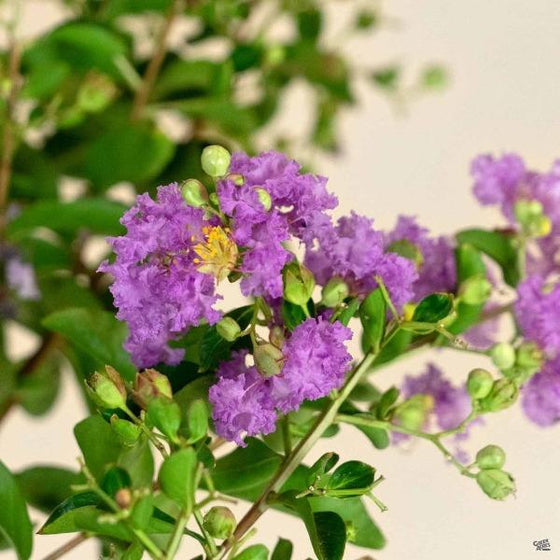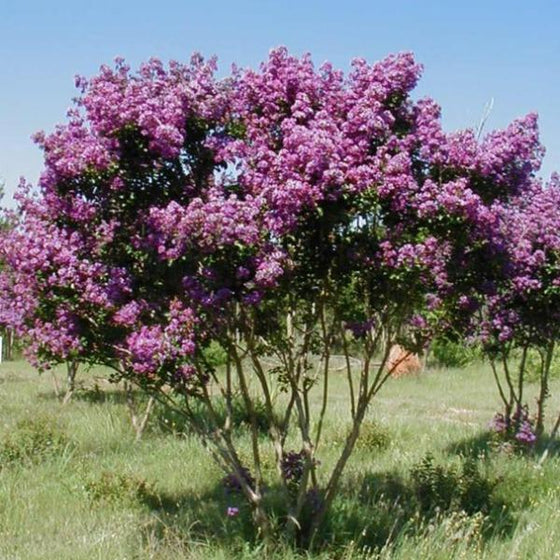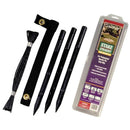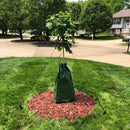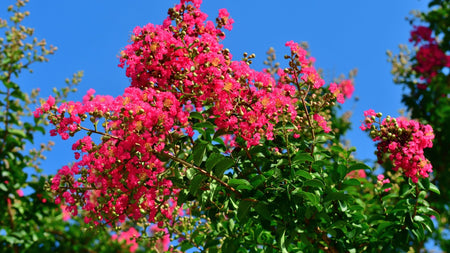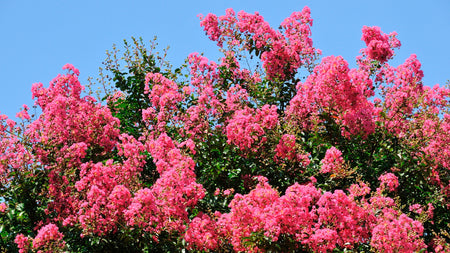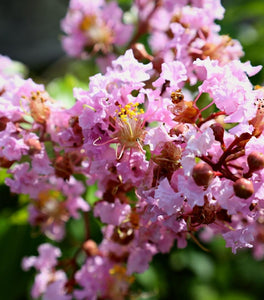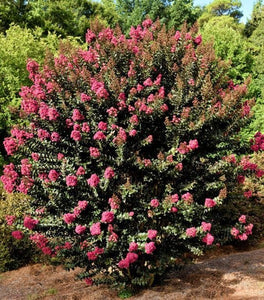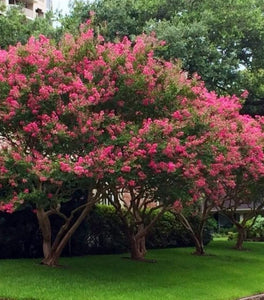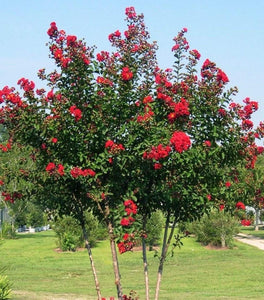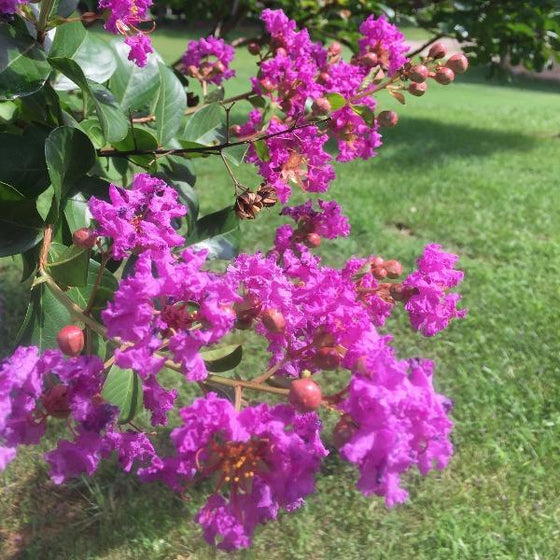
Images Depict Mature Plants
Catawba Crape Myrtle Trees
Catawba Crape Myrtle (Lagerstroemia indica 'Catawba') is a beloved ornamental tree known for its rich, vibrant purple flower clusters and compact, rounded growth habit. From midsummer through early fall, Catawba brings dramatic, long-lasting color to landscapes when many other plants are fading. This classic crape myrtle variety features dark green foliage that turns brilliant shades of orange and red in the fall, adding multi-season interest. Growing to a manageable size of about 12 to 15 feet tall and wide, Catawba Crape Myrtle is an ideal choice for small gardens, foundation plantings, and colorful mixed borders.
Thriving in full sun and well-drained soil, Catawba Crape Myrtle is drought-tolerant once established and highly resistant to common problems like powdery mildew. Its deep purple blooms attract bees, butterflies, and other pollinators, making it an excellent addition to wildlife-friendly gardens. Catawba provides consistent beauty with minimal maintenance, whether planted as a stunning focal point, a flowering hedge, or in mass groupings for a bold statement. It’s an easy-care option for gardeners seeking reliable summer color and compact size without sacrificing ornamental impact.
Perfect for sunny landscapes, suburban yards, and urban gardens, Catawba Crape Myrtle brings enduring elegance and pollinator-friendly blooms to a wide range of garden designs. Its vibrant flower color, attractive fall foliage, disease resistance, and drought tolerance make it one of the most dependable and visually striking crape myrtle varieties available. Add Catawba Crape Myrtle to your landscape and enjoy a burst of stunning purple blooms and dynamic seasonal interest year after year.
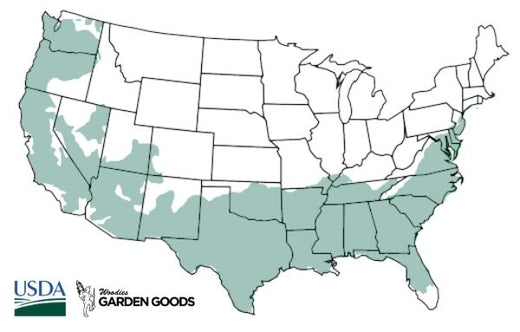
| Hardiness Zone: | 7-10 |
|---|---|
| Mature Height: | 10 to 15 Feet |
| Mature Width: | 10 to 15 Feet |
| Classification: | Multi-stemmed deciduous tree |
| Sunlight: | Full sun |
| Habit: | Upright, rounded canopy |
| Flower Color: | Violet purple from late summer to mid fall |
| Foliage: | Glossy green, orange-red in the fall |
| Soil Condition: | Any well drained soil |
| Water Requirements: | Water well until established |
| Uses: | Extremely attractive when used as a focal point in the mixed border, mass planting, or a specimen planting. Also try them in large containers on the patio |
How to Care for Catawba Crape Myrtle
Once you buy a Purple Catawba Crape Myrtle Tree, make sure to read about the care instructions that are recommended to keep this plant healthy and thriving.
How do I plant A Catawba Crape Myrtle Tree?
To plant your Catawba Crape Myrtle Tree successfully, choose a location that receives full sun for at least six hours a day, as abundant sunlight ensures the richest purple blooms and healthiest growth. Crape myrtles prefer well-drained soil and can tolerate a range of soil types, including clay, as long as drainage is good. Begin by digging a hole twice as wide and the same depth as the root ball, loosening the soil at the bottom to encourage deep root penetration. Carefully place the tree in the hole, making sure the top of the root ball sits level with or slightly above the surrounding soil. Backfill with a mix of native soil and organic compost, and water deeply to settle the soil around the roots. After planting your Catawba Crape Myrtle, apply a 2–3 inch layer of organic mulch around the base, keeping it a few inches away from the trunk to prevent rot and disease. Mulch helps conserve soil moisture, regulate soil temperature, and suppress weed growth. During the first growing season, water consistently to help the tree establish a strong root system, allowing the soil to dry slightly between waterings. With proper planting and early care, your Catawba Crape Myrtle will flourish, rewarding you with vivid purple flowers throughout the summer and brilliant fall foliage, making it a standout addition to your sunny landscape.
How do I water my Catawba Crape Myrtle Tree?
Watering your Catawba Crape Myrtle Tree correctly is essential for establishing strong roots and promoting abundant, vibrant blooms. During the first growing season, water deeply once or twice a week, allowing the top few inches of soil to dry slightly between waterings. Deep, slow watering encourages the roots to grow downward, creating a stronger, more drought-tolerant tree. It’s best to water at the base of the plant rather than overhead to prevent fungal diseases and to maintain the health of the dark green foliage and vibrant purple flowers. Once established, Catawba Crape Myrtle Trees are remarkably drought tolerant and typically only require supplemental watering during extended periods of extreme heat or drought. Monitor soil moisture regularly during hot summer months and provide a thorough soaking if the soil becomes very dry. Mulching around the base helps conserve soil moisture and reduces the need for frequent watering. With proper watering habits, your Catawba Crape Myrtle will thrive, offering bold color, lush foliage, and reliable performance throughout the growing season.
How do I fertilize my Catawba Crape Myrtle Trees?
Fertilizing your Catawba Crape Myrtle Tree properly helps promote vigorous growth, lush foliage, and abundant summer blooms. In early spring, just as new growth begins to emerge, apply a balanced slow-release fertilizer, such as a 10-10-10 or 12-4-8 formula, around the tree’s drip line. Avoid placing fertilizer directly against the trunk to prevent root burn. Lightly work the fertilizer into the top few inches of soil and water thoroughly to help the nutrients reach the root system. This early-season feeding gives your Catawba Crape Myrtle the boost it needs to produce strong branches and vivid purple flowers. For additional support, you can provide a light second feeding in mid-summer if the tree’s growth seems slow or if the soil is particularly poor. Avoid fertilizers high in nitrogen alone, as they can encourage excessive leafy growth at the expense of flowering. Organic compost or well-aged manure can also be added to enrich the soil naturally over time. With proper fertilization, your Catawba Crape Myrtle Tree will reward you with dense foliage, vibrant blooms, and brilliant fall color, ensuring it remains a standout feature in your sunny landscape year after year.

How and When Should I prune my Catawba Crape Myrtle Trees?
Pruning your Catawba Crape Myrtle Trees at the right time and with the correct technique is essential for maintaining their natural beauty, encouraging strong branching, and maximizing flower production. The best time to prune is in late winter to early spring before new growth begins but after the threat of hard frost has passed. Start by removing any dead, damaged, or crossing branches to open up the canopy and improve air circulation. Avoid severe topping or "crape murder," which can lead to weak, unattractive growth. Instead, focus on light shaping and selective thinning to maintain the tree’s elegant, rounded form. When pruning your Catawba Crape Myrtles, aim to enhance their natural vase-like structure by trimming small inward-growing branches and suckers from the base of the tree. Light pruning after the first flush of blooms can also encourage a second, lighter blooming period later in the summer. Always use clean, sharp tools to make precise cuts just above a bud or branch junction. Proper, minimal pruning will ensure your Catawba Crape Myrtle delivers a spectacular display of rich purple blooms each summer while preserving its graceful shape and strengthening its overall health for years to come.


